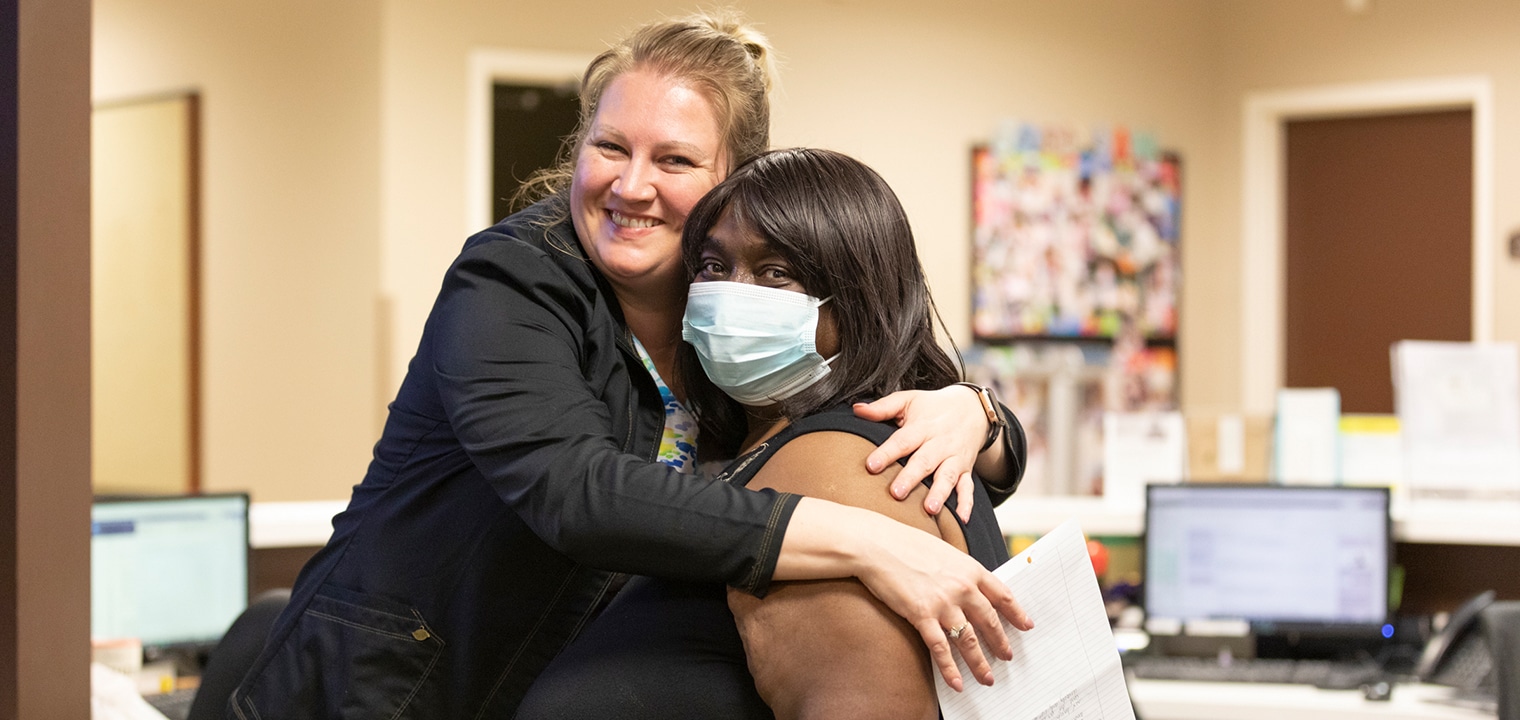
Protecting Mental Health
Project HOPE is expanding access to mental health care for health workers, refugees, new mothers, and communities around the world.
An Invisible Burden
Mental health issues are a reality of life in every community, in every country, on every continent. Yet millions of people carry their burdens in silence.
The impact of mental health on our physical health runs deep. Emotional and psychological wounds can be just as catastrophic as physical ones. The challenges and stressors of COVID-19 have taken a major toll on mental health worldwide, especially among women and health care workers. As conflict becomes more common, millions of children and families struggle to cope with the trauma of living through war and displacement.
Mental health is a human right — and everyone deserves access to the care they need to reach their full potential. Around the world, Project HOPE’s mental health work is helping more than 100,000 health workers, refugees, and new mothers in more than 41 countries access the mental health support they need to protect their health and well-being.
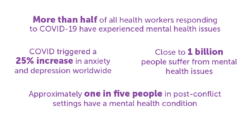
![]()
A Global Crisis
Mental health issues are on the rise around the world. Depression is a leading cause of disability worldwide, while suicide is the fourth leading cause of death in young people ages 15 to 29. Close to 1 billion people suffer from mental health issues every day — including 20% of the world’s adolescents and children — and half of all lifetime mental illness begins by age 14.
Tragically, two-thirds of people don’t receive the care they need, even though there are effective treatments. The availability of specialized mental health services is even more limited in developing countries, where 76% to 85% of people suffering from mental conditions lack access to care. Many low-income countries have less than 1 mental health worker for every 100,000 people, and in most countries, the mental health care system is privatized, so insurance does not cover mental health care. Although more attention is being paid to the need for quality mental health services, governments still spend only about 2% of health budgets on mental health care.
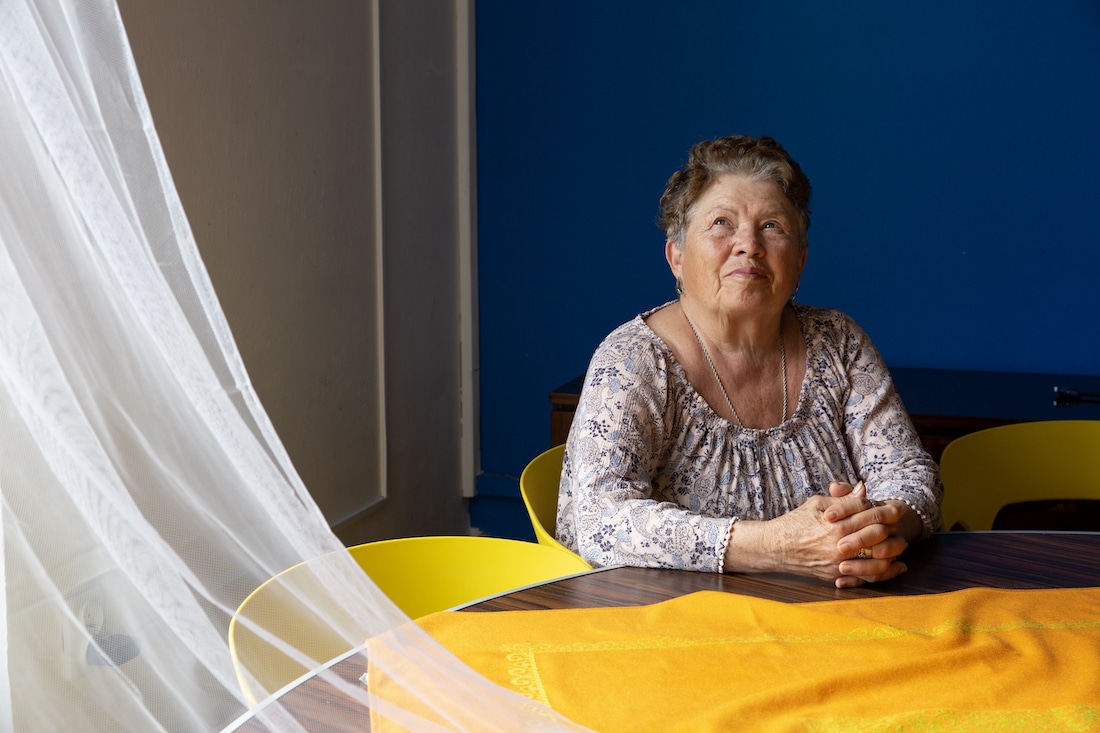
The already grim mental health crisis has only been compounded by COVID-19, with millions of people experiencing the emotional and psychological effects of the worst global health emergency of our lives. The fear of the virus, the weight of uncertainty, the strain on finances, the need to continuously adapt, the isolation from friends and family, the experience of loss — these are daily stressors felt around the world for the past two years.
>> Read: Women Carry An Undue Mental Health Burden. They Shouldn’t Have To.
Health workers are among the most vulnerable to the mental health effects of the pandemic. COVID-19 has placed a huge strain on nurses and doctors, with high rates of anxiety, depression, insomnia, and distress reported among frontline health workers. More than half of those responding to the virus have experienced mental health issues.
“They’re tired. They’re exhausted. They’ve been working in such poor conditions. They’ve also been dealing with a lot of loss and grief while also worrying about catching COVID,” says Rawan Hamadeh, a program officer leading Project HOPE’s mental health programs.
Whether responding in the face of disaster or crisis, or the result of years of work in a difficult environment, nurses, doctors, and other health workers face incredible levels of stress and demand. Before the pandemic, doctors were already twice as likely to die by suicide.
As anxiety, depression, loneliness, and other mental health concerns increase, so will the need for mental health services, making it more important than ever that we invest in support programs that respond to mental health .
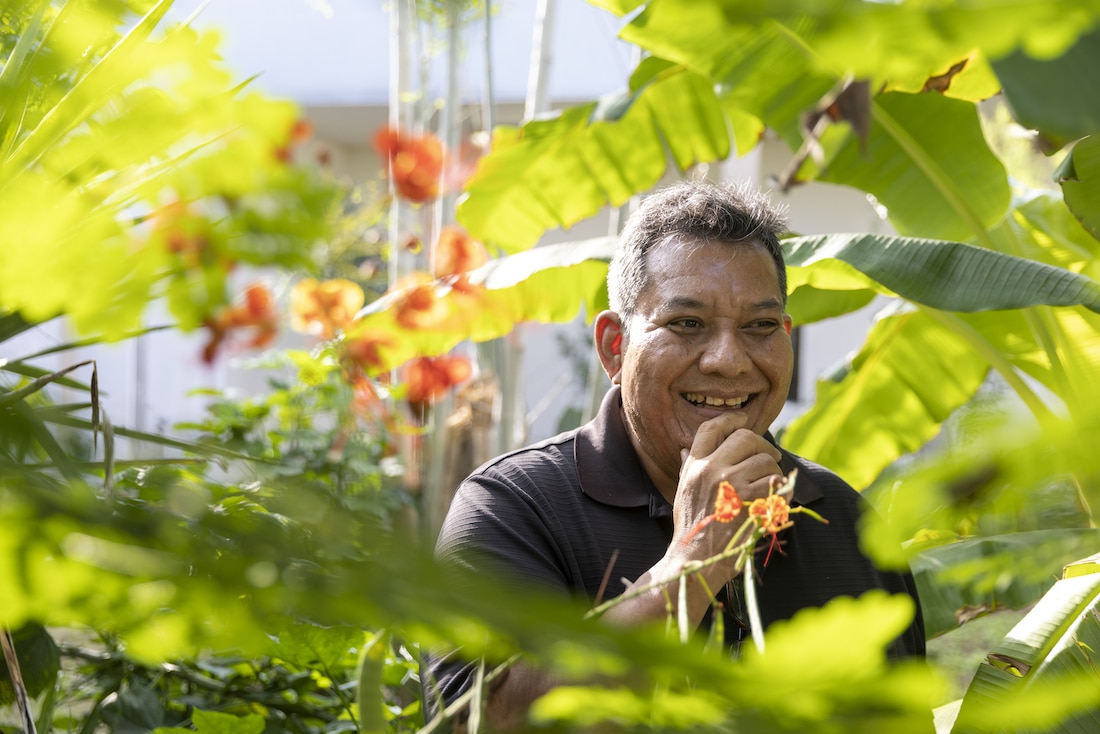
How Project HOPE Is Addressing Mental Health
Training health workers
Project HOPE is working to build a world where everyone has access to quality care — and that includes health care for health workers.
To address the toll of COVID-19 on mental health, Project HOPE is implementing mental health and resiliency trainings for frontline health workers. Originally piloted in the Dominican Republic and Indonesia with support from the Abbott Fund, the training is expanding across five continents and reaching some of the world’s most vulnerable countries and communities, thanks to generous support from the Center for Disaster Philanthropy and the Medtronic Foundation. As of July 2023, this program has been adapted and implemented in 41 countries and reached more than 100,000 health workers.
The training modules are adapted to local contexts and based on the Healing, Education, Resilience & Opportunity for New York’s Frontline Workers (HERO-NY) program, a train-the-trainer series developed by New York City Health + Hospitals in partnership with the U.S. Department of Defense. The training includes five sessions:
- Stress, Trauma, and Resiliency
- Personal and Professional Wellness
- Impact, Effect, and Outcome on Frontline Workers
- Seeking Help for Ourselves and Others
- Resilience and Wellness Program Development
Project HOPE’s first mental health training session in Indonesia reached 132 doctors, nurses, and psychologists. For many of them, it was the first time to discuss emotional and psychological health issues openly. Photo courtesy KUN Humanity System+, 2020.Held both in-person and online, the trainings give health care workers stress management and coping tools for self-care. Together, participants talk openly about burnout, exhaustion, and compassion fatigue — an important step in reducing stigma and normalizing a support system that is often overlooked in clinical settings.
To ensure continual progress and improvement, we are carefully monitoring and evaluating the experiences of those who participate in trainings. As part of this effort, trainees take self-care and lifestyle surveys before, during, and after the trainings which access the impact on their level of burnout.
Supporting refugees and those experiencing conflict
Exposure to war, conflict, and disaster can have a serious and lifelong effect on mental health — especially for children and families forced to flee home and start over somewhere new. Depression, anxiety, post-traumatic stress disorder, and other common mental health disorders are highly prevalent among refugee and migrant populations, and many of them lack access to quality treatment and care.
Project HOPE is working to change that.
In times of crisis, we work with local partners to reach refugee and migrant families with mental health support as they settle into new countries and host communities and grieve the lives — and people — they had to leave behind. This includes training local health workers to be able to provide mental health and psychosocial support.
>> Read: In A Crisis, The Deepest Scars Can’t Be Seen
Mental health for Ukrainian refugees
Project HOPE is providing mental health support to thousands of people impacted by the war in Ukraine.
In Moldova, we have established eight playrooms that have provided services to hundreds of Ukrainian refugee children. In Poland, we provided a $425,000 grant to the local NGO Podkarpackie Stowarzyszenie dla Aktywnych Rodzin (PSAR) for the provision of mental health support to Ukrainian refugees, specifically women and children in Rzeszow. The Center for Psychophysical Development TUTU has provided mental health assistance to more than 2,200 Ukrainian Refugees and local residents. In Romania, we have reached more than 7,100 Ukrainian refugees with mental health and psychosocial support. In partnership with the local NGO Estuar Foundation, we have also trained health workers, social workers, and volunteers on how to support the mental health and well-being of the Ukrainian refugee families they work with.
Protecting new mothers
One in five women experience mental health issues like anxiety and depression during pregnancy or in the first year of motherhood, and most of them don’t receive treatment.
We are integrating mental health support into our health worker training, ensuring doctors, nurses, and midwives have the awareness and knowledge they need to address mental health issues as part of routine pre- and postnatal care.
In Indonesia, Project HOPE is improving access to mental health and psychosocial services for pregnant and postpartum women in the districts of Bandung City, Bantul, and Klaten.
We’re equipping the frontline health care workers with skills to identify the common types of stressors most relevant to women during pregnancy and postpartum periods. We’re also training them to provide Psychological First Aid to mothers with a high-risk pregnancy.
This work will improve the delivery of quality care for women and their families. Over the next two years, this program intends to train half of all midwives and nurses working at health care facilities in the three districts and reach one in five of all expecting and new mothers seeking care at these facilities.
“All pregnant women should be screened for potential mental health problems, and those who are found to be at risk should receive follow-up care,” says Dian Assiddika, a program manager for Project HOPE. “Both the mother and the child benefit when prenatal depression and anxiety are identified and treated. It can offer a strong foundation for coping mechanisms, even though it cannot guarantee that mental health issues won’t appear in the future.”
![]()
Impact That Lasts
For more than 60 years, Project HOPE has worked to support local health workers in building a healthier world — and that starts with prioritizing and protecting their own health and well-being.
In the shadows of COVID-19, we are providing a lifeline of hope for tens of thousands of health workers around the world.
Project HOPE’s mental health and resilience trainings have reached more than 68,500 health care workers in over 30 countries worldwide. Nearly three-quarters of these health workers are women. The training has been translated into multiple languages, with the long-term goal of providing training during other global health emergencies, natural disasters, and humanitarian crises — when support is needed most. Trainings are ongoing in the United States and South Africa, and currently expanding to reach an additional 16,000 health workers in countries including Syria, Yemen, and Colombia.
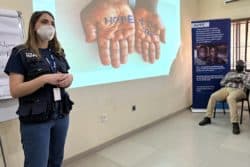
How you can help
Make a lifesaving gift to support our work now and for the future at projecthope.org/donateAre you a health worker or other professional who would like to learn more about volunteering abroad with Project HOPE? Learn more about our volunteer program and join our volunteer roster.
Are you a creator looking to make a difference? Start a charity stream on Tiltify or StreamLabs to help us send HOPE to families displaced by crisis. Make sure to tag us on social @projectHOPEorg to let us know about your efforts.
Stay up-to-date on this story and our lifesaving work around the world by following us on Facebook, Instagram, LinkedIn and Twitter, and help spread the word by sharing stories that move and inspire you.